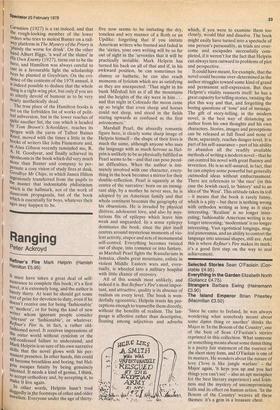Ranging
peter Ackroyd „Refiner's Fire Mark Helprin (Hamish Hamilton £5.95) It must have taken a great deal of selfassurance to complete this book; it's a first novel, it is extremely long, and the author is barely thirty. At least he should get some sort of prize for devotion to duty, even if he doesn't receive one for being 'fashionable' or 'modern, or for being the kind of new WI ter whom ignorant people consider ,relevant or 'fashionable', or whatever. efiner's Fire is, in fact, a rather oldmshioned novel. It receives impressions of the outer world without cynicism or the _self-confessed failure to understand, and Mark Helprin is so sure of his own narrative skills that the novel glows with his permanent presence. In other hands, this could all become breathless and boring, but HelPim escapes fatuity by being genuinely talented. It needs a kind of genius, I think, M accept orthodoxy and, by accepting it, to Make it live again. , In other words, Helprin hasn't trod uoggedly in the footsteps of other and older novelists. Everyone under the age of thirty
five now seems to be imitating the dry, toneless and wry manner of a Roth or an Updike: forgetting that if you imitate American writers who burned and faded in the 'sixties, your own writing will be so far out of sight in the 'seventies that it will be practically invisible. Mark Helprin has turned his back on all of that and if, in his awkward position, he can sometimes be clumsy or bathetic, he can also reach moments of lyricism which are as satisfying as they are unexpected: 'That night in his bunk Marshall felt as if all the mountains and the heights of the sky were in him . . .
and that night in Colorado the moon came up so bright that even sheep and horses could not sleep, and stood in the fields staring upwards as confused as the first• astronomers.'
Marshall Pearl, the absurdly romantic figure here, is clearly some sharp image of Helprin himself — the shape of their lives is much the same, although anyone who uses the language with as much fervour as Hel prin is unlikely to be as physically fulfilled as Pearl seems to be — and that can pose peculiar difficulties. When the author is intimately involved with one character, everything in the book becomes a mirror for their double-reflection. Pearl is squarely at the centre of the narrative: born on an immigrant ship, by a mother he never sees, he is adopted by an American family and that whole continent becomes the geography of his obsessions. He is invaded by physical distress, adolescent love, and also by mysterious fits of epilepsy which leave him weak and unguarded. In a sense epilepsy dominates the book, since the plot itself centres around mysterious moments of violent activity, stupor and acts of monumental self-control. Everything becomes twisted out of shape, into romance or into fantasy, as Marshall Pearl fights the Rastafarians in Jamaica, climbs great mountains, enlists in violent Middle Eastern wars and, eventually, is wheeled into a military hospital with little chance of recovery.
All of this sounds most unlikely, and indeed it is. But Refiner's Fire's most important, and attractive, quality is its absence of realism on every level. The book is wonderfully egocentric; Helprin trusts his perceptions enough to transcribe them directly, without the benefits of realism. The language is affective rather than descriptive, floating among adjectives and adverbs
which, if you were to examine them too closely, would blur and dissolve. The book might easily have turned into a spectacle of one person's personality, as trials are overcome and escapades successfully completed, if it weren't for the fact that Helprin can always turn outward to problems of plot and perspective.
It could have meant, for example, that the novel could become over-determined as the author struggles toward some kind of grand and permanent self-expression. But then Helprin's vitality reasserts itself: he has a great capacity for telling stories, twisting the plot this way and that, and forgetting the boring questions of 'tone' and of message. The gift of story-telling, in the modern novel, is the best way of distancing an author from his own thoughts and his own characters. Stories, images and perceptions can be released at full flood and none of them, separately, reaches danger-level. It is part of his self-assurance — part of his ability to abandon all the readily available methods of writing a modern novel — that he can control his novel with great fluency and invention. He is so self-assured, in fact, that he can employ some powerful but generally outmoded ideas without embarrassment. There are references to 'the race' (in this case the Jewish race), to 'history' and to an idea of 'the West'. This attitude takes its toll — it means that the book is rarely funny, which is a pity — but there is nothing wrong with orthodox writing as long as it stays interesting. 'Realism' is no longer inter esting; fashionable American writing is no longer interesting; 'modernism' is no longer interesting. Vast egotistical longings, mag ical panoramas, and an ability to contort the language into unusual shapes, still are. And
this is where Refiner's Fire makes its mark; it's a good first step on the way to real achievement.


































 Previous page
Previous page